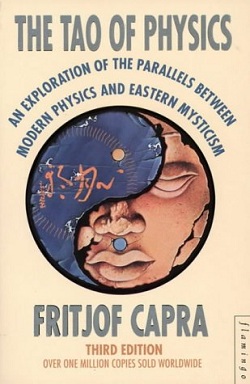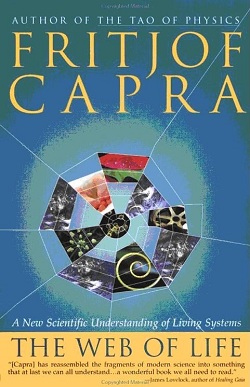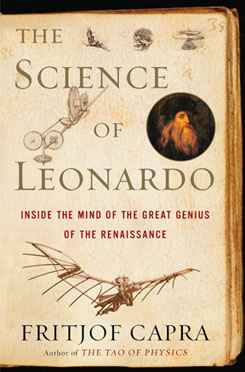 Fritjof Capra (born February 1, 1939) is an Austrian-born American physicist. He is a founding director of the Center for Ecoliteracy in Berkeley, California, and is on the faculty of Schumacher College.
Fritjof Capra (born February 1, 1939) is an Austrian-born American physicist. He is a founding director of the Center for Ecoliteracy in Berkeley, California, and is on the faculty of Schumacher College.
Born in Vienna, Austria, Capra attended the University of Vienna, where he earned his Ph.D. in theoretical physics in 1966. He conducted research in particle physics and systems theory at the University of Paris (1966–1968), the University of California, Santa Cruz (1968–1970), the Stanford Linear Accelerator Center (1970), Imperial College, London (1971–1974), and the Lawrence Berkeley Laboratory (1975–1988). He also taught at U.C. Santa Cruz, U.C. Berkeley, and San Francisco State University.
He has written popular books on the implications of science, notably The Tao of Physics, subtitled An Exploration of the Parallels Between Modern Physics and Eastern Mysticism. The Tao of Physics makes an assertion that physics and metaphysics are both inexorably leading to the same knowledge. He is fluent in German, English, French, and Italian.
After touring Germany in the early 1980s, Capra co-wrote a book on Green Politics with ecofeminist author Charlene Spretnak called Green Politics, in 1984.
Capra contributed to the screenplay for the 1990 movie Mindwalk, starring Liv Ullman, Sam Waterston, and John Heard, which was loosely based on his book, The Turning Point.
In 1991 Capra coauthored Belonging to the Universe with David Steindl-Rast, a Benedictine monk. Using Thomas Kuhn's The Structure of Scientific Revolutions as a stepping stone, their book explores the parallels between new paradigm thinking in science and religion that together offer what the authors consider remarkably compatible view of the universe.
Capra pushes for western society to abandon conventional linear thought and the mechanistic views of Descartes. Critiquing the reductionistic Cartesian view that everything can be studied in parts to understand the whole, Capra encourages his readers to take a holistic approach. In The Web of Life, Capra focuses on the systemic information generated by the relationships among all the parts as a significant additional factor in the character of the whole, emphasizing the web-like structure of all systems and thus the interconnectedness of all parts.
Capra is purportedly setting the grounds for change in many new theories, one of which is the living systems theory, a theoretical framework for ecology. This theory is only now fully emerging but it has its roots in several scientific fields that were developed during the first half of the twentieth century — organismic biology, gestalt psychology, ecology, general systems theory, and cybernetics.
Fritjof Capra is a founding director of the Center for Ecoliteracy located in Berkeley, California, which promotes ecology and systems thinking in primary and secondary education.
BIBLIOGRAPHY
 The Tao of Physics, Capra's first book, challenges much of conventional wisdom by demonstrating striking parallels between ancient mystical traditions and the discoveries of 20th century physics. Originally published by a small publisher with no budget for promotion, the book became an underground bestseller by word of mouth before it was picked up by a major American publishing house. Since then, The Tao of Physics has been published in 43 editions in 23 languages.
The Tao of Physics, Capra's first book, challenges much of conventional wisdom by demonstrating striking parallels between ancient mystical traditions and the discoveries of 20th century physics. Originally published by a small publisher with no budget for promotion, the book became an underground bestseller by word of mouth before it was picked up by a major American publishing house. Since then, The Tao of Physics has been published in 43 editions in 23 languages.
In The Turning Point, the author expands his focus to show how the revolution in modern physics foreshadows a similar revolution in many other sciences and a corresponding transformation of world views and values in society. In particular, he explores paradigm shifts in biology, medicine, psychology, and economics. The book has been published in 25 editions in 16 languages.
In Uncommon Wisdom, the author describes dialogues and personal encounters between himself and the thinkers who helped shape the theme of The Turning Point. The book has been published in 16 editions in 12 languages.
The Web of Life starts from the conceptual framework presented in The Turning Point, summarizes the mathematics of complexity, and offers a synthesis of recent nonlinear theories of living systems that have dramatically increased our understanding of the key characteristics of life. The book has been published in 14 editions in 10 languages.
 In The Hidden Connections: A Science for Sustainable Living, the author extends the framework of systems and complexity theory to the social domain and uses the extended framework to discuss some of the critical issues of our time -- the management of human organizations, the challenges and dangers of economic globalization, the scientific and ethical problems of biotechnology, and the design of ecologically sustainable communities and technologies. The book has been published in 11 editions in 8 languages.
In The Hidden Connections: A Science for Sustainable Living, the author extends the framework of systems and complexity theory to the social domain and uses the extended framework to discuss some of the critical issues of our time -- the management of human organizations, the challenges and dangers of economic globalization, the scientific and ethical problems of biotechnology, and the design of ecologically sustainable communities and technologies. The book has been published in 11 editions in 8 languages.
Die Capra Synthese (The Capra Synthesis) presents an annotated selection of the author's essential texts in two German editions.
Green Politics, co-authored with Charlene Spretnak, analyzes the rise of the Green Party in Germany and similar ecology-oriented political parties in other European countries. The book has been published in 7 editions in 4 languages.
Die Seele Indiens: Tamil Nadu (Tamil Nadu: The Soul of India), coauthored with Jacqueline Capra, is a photo essay on daily life in the villages and cities of Tamil Nadu in southern India.
Belonging to the Universe, co-authored with Brother David Steindl-Rast, explores parallels between new ways of thinking in science and Christian theology. The book has been published in 10 editions in 7 languages.
Mindwalk contains the complete screenplay of Bernt Capra's film, cowritten by Floyd Byars and Fritjof Capra, together with introductory comments by the film's director and a scientific commentary by Fritjof Capra.
 EcoManagement, co-authored with Ernest Callenbach, Lenore Goldman, Ruediger Lutz, and Sandra Marburg, proposes a conceptual and practical framework for ecologically conscious management. The book has been published in 5 editions in 4 languages.
EcoManagement, co-authored with Ernest Callenbach, Lenore Goldman, Ruediger Lutz, and Sandra Marburg, proposes a conceptual and practical framework for ecologically conscious management. The book has been published in 5 editions in 4 languages.
Steering Business Toward Sustainability, co-edited with Gunter Pauli, is a collection of essays by business executives, economists, ecologists, and others who outline practical approaches to meeting the challenge of ecological sustainability. The book has been published in two editions in two languages.
The Science of Leonardo is the first book to present a coherent account of the scientific achievements of Leonardo da Vinci, the great genius of the Renaissance, and to evaluate them from the perspective of 21st-century scientific and philosophical thought. Its central thesis is that Leonardo's science is a science of living forms, of quality, which can be seen as a distant forerunner of today's complexity and systems theories. It is a science that honors and respects the unity of life, recognizes the fundamental interdependence of all natural phenomena, and reconnects us with the living Earth. Leonardo's science is thus highly relevant to our time. The book has been published in 7 editions in 5 languages.








